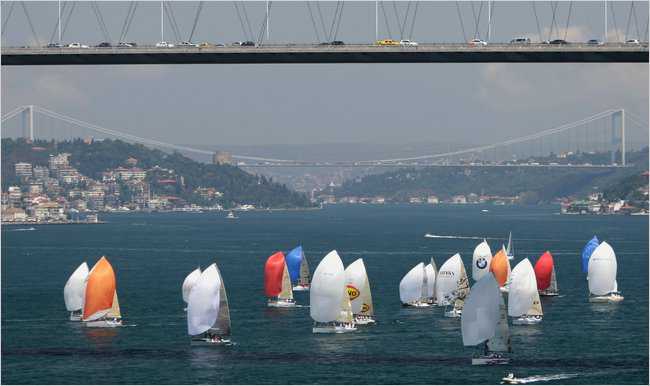Letter from Turkey
… nation at a crossroads
HORIZONS BY DR.JAVID IQBAL
An aerial view, as the aircraft descends for a landing at Istanbul’s Ata Turk international airport, brings into focus, the wide expanse of Bosporus, the waterway provides the continental divide between Asia and Europe. Turkey, by the very nature of its geographical layout is a nation at crossroads, being one and only Eurasian State. The erstwhile Soviet Union could claim to be another; however with its break-up, the Central Asian States are an entity apart from European Russia.
Istanbul, that was Christian ‘Constantinople’ Arabic ‘Qastantaniya’ ‘Islambol’ of Othman Turks has changed names, as well as faces, much like other great historical cities. For anyone conversant with its past, even a short stay, a cursory look at the print and the electronic media throws open the dilemmas, the contradictions, the idiosyncrasies, as well as the challenges facing Turkey. Ankara might be the Turkish capital; Istanbul continues to be commercial and cultural hub–the soul of the Nation!
Turkey is a democracy, one of the few Islamic nations that practices the desirable. However within an otherwise secular polity, in election after election, in ballots fair and square, Islamist forces since 2002 elections have emerged as clear winners. The rising graph of vote share of Prime Minister Recep Tayyip Erdogan’s modernistic Islamist force–Just and Development (AK) party is indicative of new trend in Turkey. The party got 34% vote in 2002 election, 46.6% in 2007 and 49.83 % in 2011 [327 members in a house of 550 members].
Question remains—Is Just and Development (AK) party not secular enough? The secularists would like to believe that Islamists are anything but secular. Secularists also called Kamalists [followers of Ata-Turk Mustapha Kamal Pasha] paint Islamists in negative shades. Ata-Turk—father of secular Turkish state did away with Othmans [Khalifat-e-Usmaniya in vernacular] the last Islamic caliphate in 1922/23. Turkey by then was labeled the ‘Sick-man’ of Europe. Ata-Turk did well to get Turkey out of dire straits. The deed done, he faltered in his assessment of Turkey’s past, as well as future needs. The Othmans he ridiculed were in an earlier era masters of Balkans [Eastern Europe]. Turkish Ghazis—the warriors were the feared lot. Much more than all the European intrigues against Othmans, the inherent weaknesses of Othman Caliphate made Turkey; the ‘Sick-man’ Europe started calling it. It was not Islam per-se or Islamic practices that undid Turkey, but the sickening degradation of Turkish Court. As 20th turned into 21st century, Turks started realizing yet again the glory inherent in Islam.
Islamists turned around the sinking Turkish economy, making modernizing economy a priority consistent with Islamic practices. Erdogan should have felt increasingly comfortable; however Kamalist power structure has much more than an elected legislature and political executive to shape the state. Apart from powerful army, the oversight of secular constitutional court constitutes the road block that Erdogan is up against. The secularists tend to reverse whatever Erdogan comes-up with. It has however a dilemmatic dichotomy.
Secular Turkish army forms a powerful wing of NATO; an aspect Erdogan keeps up with, America thus remains unperturbed with Erdogan’s Islamic belief. Turkey’s plea for full European Union [EU] membership has Erdogan taking it to logical conclusions. Though Turkey has been granted trade concessions, full membership is years shy. Nevertheless, Erdogan has worked for legislation to fulfill membership obligations—improving the human rights record, a fair deal to Kurds at odds with the Turkish state and women’s rights.
Women’s rights are in straits. While as secularists favour women’s liberation, Islamists opt for right to wear a scarf. The secularists had banned students from wearing a scarf in higher educational institutions. Turkish army implied a ban on entry of any woman with scarf inside army buildings. In 2007, Erdogan’s wife wearing a scarf was stopped at entry point of an army building. Far from a pressing the panic button, Erdogan took it with stoic resolution to undo practices inconsistent with Islamic beliefs. The effort to do away with ban on scarf resulted in constitutional court trying to do away with Erdogan’s Islamist Party. The court has the powers to ban political parties, whatever their public support or bench strength. While as secular opposition in Turkey’s unicameral legislative body [Bayuk Millet Meclisi—Bayuk (Grand) Millet (National) Meclisi (Assembly—Majlis in vernacular)] powerful elements within judiciary and army would love to throttle Islamists, their public support puts them on hold.
Erdogan’s efforts to preempt such a move entailed putting his ilk-Islamist Abdullah Gul as President in 2007, holding a referendum on constitutional reforms in 2010 and legislation off and on to affect change. The effort is geared to restructure the stifling constitutional court and curb the army by making it answerable to elected civilian authority, as well as civilian courts for offences it might commit. Army has been throwing hints that upholding secular values might prompt it to repeat what it did in 1960, 1971, 1980 and 1997—coup! The fear however is of burning fingers in present power dispensing.
Modern Islamist Turkey poses an interesting question—does the mere pronouncement of secularism provide immunity from moves against democratic practice? While Turkey gropes for an answer, Erdogan is strengthening ties with Islamic world while maintaining links with Israel, USA and EU. The world is increasingly seeing in Turkey a moderating Islamic force that might be help in dousing the fires of what is erroneously called civilizational war between western and Islamic world! No to war and yes to a tolerant view of variation in values constitutes the desirable—Turkey provides the example worth emulating!
Yaar Zinda, Sohbat Baqi [Reunion is subordinate to survival]
